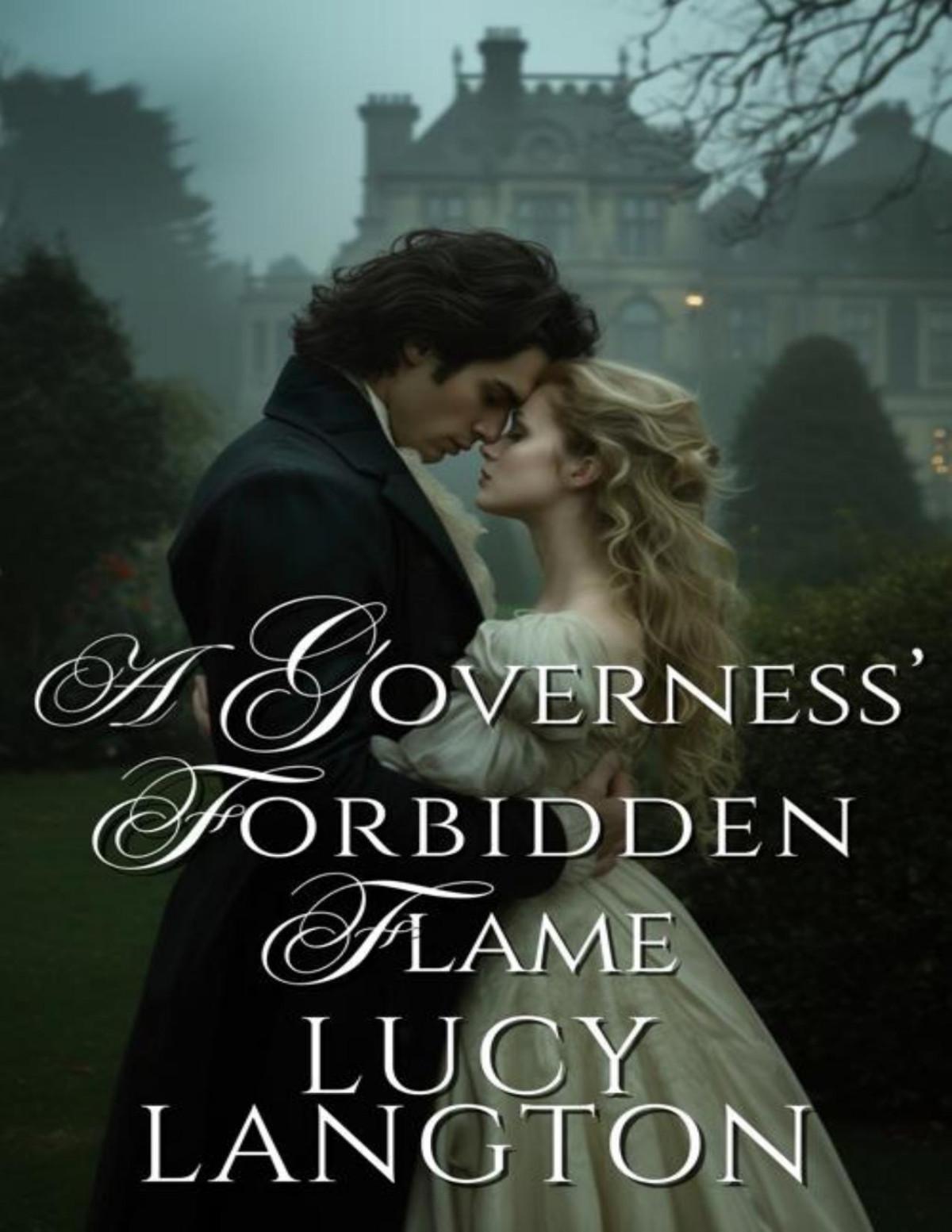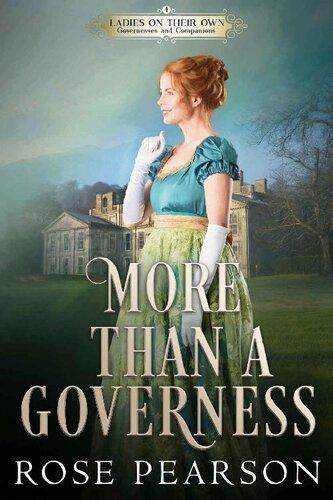Introduction
KatherineGalloway,grievingherfather'sdeath,facesfurtherdistresswhenherbrotherinsistsonherweddingwithanaffluent, elderlybaronettopreservethefamilywealth.Desperatetoescapethishorriblefate,sheassumesanewidentityandbecomes thegovernesstotwoorphanedgirlsatanancientmanoronthewildnorthmoors.Tohersurprise,shefindsherselfincreasingly drawntotheirreservedandaustereguardian,theMarquessofMidland
CanKatherinediscoverloveasahumblegovernesslivingunderaconcealedidentity?
William, the Marquess of Midland, finds himself guardianto his two youngnieces followinga familytragedy. Distant and withdrawnfromsociety,Williamfightsagainsthismother’sdesiretohavehimmarryalocalbeauty Littledidheknowthatthe arrivalofthenewgovernesswouldsparkanimmediateinterestandattractionwithinhim.Yet,heunderstandsthatpursuingher, givenherlowlystatus,woulddefysocietalnormsorcausescandal.
Willherejectconventionandallowthisforbiddenromancetoturnhislifeupsidedown?
In the moments they share, William and Katherine sense an undeniable, blossoming connection that slowly warms their troubledsouls.Therulesofsociety,though,lookcertaintoextinguishthisfragilebond. Assnow cloudsgather,rumorsofa mysteriousstrangerarrivinginthevillagespread CouldtheshadowofKatherine’spastreachasfarasthisremotelandscape? WillKatherineandWilliamdefyopposition,conquertheevilgatheringaroundthem,andfindaneverlastinglove?
“YouwillmarrySirJasonProtheroe Thearrangementsaremade,andifyourefuse,then,mydearsister,youwillbedestitute”
Katherinestaredindisbeliefatthearrogantmanstandinginfrontofher.Ifhedidn’thavepoweroverherfortune,shewould laughinhisface JamesGalloway,herbrother,lookedridiculousinhisredcoat Hewasnolongerinthearmybutinsistedon wearinghisuniformatalltimes.
It was getting a little tight for him, too,shethought What a pompous oaf
Whatshould she do? Agree to the marriage and reduce James’controllingsurveillance, or stand her ground and continue to refusetomarry?
Sheglancedataminiaturepaintingofherdearpapaonthewalnutwritingtable.
This is my home Papa and I came here when he left Cambridge; we spent so many happy evenings reading together by the fire.
In her reticule was the letter that had arrived two days ago, which provided an escape route. Her breathing eased as she consideredtheofferofagovernesspositioninthenorthcountry.
“James,Iobjecttoyouarrangingamarriageformewithouthavingthecourtesytoevenmentionittome”sheprotested “You tellmeIambetrothedtoSirJasonProtheroe,abaronetthirtyyearsolderthanme.Heis,Ibelieve,evenolderthanourfather,” sheaddedthroughgrittedteeth
Katherinemayhavebeenpetite,butherfeistypersonalitymadeupforthis.Sheraisedherchinandstoodherground,looking directlyintoherbrother’seyes Helookedaway,unabletolookherintheface
“Iamyourlegaltrustee,andifyoudonotfollowmyinstructions,thenIwillensurethatyouwillbepenniless.”
“Itisdreadfulthatamancantreatawoman,whoisofage,inthiscontrollingandcondescendingmanner,”Katherinesnapped back,herblueeyesburningwithanger.
“Come, come, my dear. All you need to do is marry Protheroe and keep himhappy for a few years,” he implored. “His settlementforyouisgenerousandwillpayfortherepairsonourpropertyandprovidemewithacommissioninthemilitia.” He banged his glass downonthe table “Katherine, youhave to see reason This marriage is the answer to all our family difficulties.”
Shereachedbehindherforthecornerofthebookcase. I am to marry a man I cannot bear because you want a country estate and a commission in the army Have you no consideration for my future? shethoughtinfrustration.
“Protheroehasconnectionsand£20,000ayear.Thishousewasneversuitablelodgingsforourfamily.Itwasnecessarytorent outourcountryestateatFairburyHouse,butyourmarriagetoProtheroemeanswecanreclaimourancestralhomeandlivethe lifeofthetonagain”
HeturnedawayfromKatherineandpouredhimselfanotherglassofcognacfromthecrystaldecanterbeforecontinuing.
“In my opinion father should never have been persuaded to let Fairbury House. If I had been home, it would never have happened,”Jamesconcludedwitharrogance.
“Youknow verywell thatFather hadno choice Our financial situationwas precarious, and the onlyoptionwas to move to town,”Katherinereplied,holdingbacktears.“Wecouldliveherecomfortably,withanincomefromrentingFairburyHouse. Thedecisionwasnottakenlightly.”
“Hewasbadlyadvised,”snarledJames.“However,yourmarriagemeansthefamilywillbesecure,andwecanholdourheads highinsocietyoncemore.”
“Youare quite despicable,” retorted Katherine. “It is clear that youare arrangingthis matchto support your ownfinancial future Youmeanthatyourfuturewillbesecure Youcarenotwhathappenstome,”sheshuddered,unabletolookatJames
Shestaredatthestill-lifeoilpaintingonthewallimmediatelybehindhim.Therewasmorelifeinthefruitandflowers,caught inamomentintime,thaninherbrother.Hewassofullofhisownschemesthathelackedallcompassion.
HowcouldJameslooksolikeherbelovedfatherandbesodifferentincharacter?JamesGallowayenjoyedusinghisheightto intimidateothers Hekepthisdarkbrownhairinanarmycutanddidn’tholdwithfashion Hisangularfeatures,paleblueeyes, andimpeccablemannersdisguisedamanipulative,controllingpersonality.Hewasnotyetthirty,buthisattitudetolifegavethe impressionofbeinginhismid-forties.
Katherinetookadeepbreath,coldairclearingherhead,andmadeasplit-seconddecisiontopretendtocapitulateandagreeto theplan.ThemonotonousdroneofJames’voice,imploringhertomarryProtheroe,hadpersistedmostoftheday;evenwhen hestoppedtalking,shecouldstillhearhimresonatinginherhead
Katherinehadanuncannyabilityforsolvingproblemswithapracticalandresourcefulapproach
She needed some quiet time to thinkabout how to put her escape planinto action. She would leave Londonand disappear withoutatrace.
She lowered her eyes and tooka seatonthe wornvelvet-covered settee, makingher tightfingers relaxinto the velvet. She neededtoconvinceJamesshehadexperiencedachangeofheart,whichwouldbetricky
“YousaythatifImarrySirJason,ourcountryestatewillreturntothefamily?” questionedKatherine.
“That,sister,iswhatIhavebeentryingtotellyouallweek,”saidJames,lookingatKatherinewithloathing
“Andallfather’sdebtswillbesettled?”shecontinued.
“Easily, the marriage settlement is verygenerous,” he added, withirritationthat his sister seemed unable to understand the necessitytomarry.Heblamedtheirfather,whohadencouragedhertohaveanindependentandinquisitivemind.
“Verywell.”KatherinepausedandlookedJamesdirectlyintheeye.Sheneededtokeephernerve,swallowingthelumpinher
throat,knowingshehadtoconvinceJamesshewassincereinthischangeofheart.
“IwillmarrySirJasonProtheroeaweekonSaturday,”shesaidquietly.
“However,” she continued,“Iinsistthatsome ofthe settlementis placedina trustinmyname,accessible onlybyme.” She tookanother breathtosteadyher racingpulse “IfIamtomarrya portly,elderlygentleman,whomIhave never met,thenI demandthatIhaveafinancialsettlementwhichbenefitsme.”
James looked confused He was unsure how to respond Onthe face ofit this was a victory, as Katherine was agreeingto marryProtheroe.However,hewasreluctanttolosecontrolofanyofthefinancialsettlement.
“Itisuptoyou,James,”continuedKatherinewithfirmresolve “ThosearemyconditionsformarryingProtheroe,andifyou agree,IshallinstructMrClayton,Papa’ssolicitor,tosetupatrustaccessibleonlybyme.”
“Very well,” agreed James with obvious reluctance “I am seriously unhappy with your attitude and demands, but, in the circumstances,Iwillagreetothoseterms.”
Soonafter, James wentto his ownroom, and she heard himsnoring He had beendrinkingheavilyall day, and she doubted anythingwouldwakehim.
TimetopackmoreofherbelongingsandpreparetoleaveLondon Shehadstartedtopackthatmorningbutaccomplishedlittle Her maid, Alice, brought her hot tea, bread, cheese, and some cold cuts of ham. She had hardlyeatenfor two days, while JameshadcontinuallybulliedherintoagreeingtomarrytheodiousSirJasonProtheroe
Katherinebegantosortthroughaboxofkeepsakes,tryingtodecideonthefewpossessionstotakewithher.Shefoundalength ofexquisiteFlemishlacebelongingtohergrandmother ShecaughtherbreathwhenMama’smoonstonenecklaceandearrings fell out ofthe lace onto the table. Evenonthis dull, cloudyday, theywere luminous inthe light. She would treasure these memoriesofhappiertimesasshecreatedanewfuture
“Oh,Miss,thisisasadday,”whisperedAlice.“I’vedonewhatyousaidandpackedmyownbag,readytoleave.Thankyou forarrangingworkformeinyourfriend’shousehold.”Alicebegantocry.“Iwishthingsweredifferent,”shesobbed.
Katherinegentlypattedherarm.“Wehavetodothebestwecan,Alice.IneedtoknowyouaresafefromJames’angerwhenhe discoversIhavegone,andyouwillfindyournewemployerisakindperson,”Katherinereassuredher
Alicesniffedandattemptedasmile.“Now,Miss,youneedtoletmepackyourthings.Iknowwhatyouwillneed,anditwill bequickerifyouletmedoit.”
Withinthe hour,Katherine’s twoportmanteaus were packedwiththe essentials she wouldneedinher new life.Theywould leaveinthemorning
Later,inthedark,shelayawake,unabletosleep.TherewasnonoiseexceptthereassuringsnoresfromJames’room.
Oh, Father, I miss you so much
James’returntoEngland,sosoonafterherfather’sdeath,hadmeantthatshehadlittleopportunitytomourn.Howshewished for one more happyeveningsittingbythe fire withher papa readingMr HenryFielding’s novel together. The adventures of TomJoneshadmadethemlaugh Ironically,theheroine,Sophia,runsawayfromhometoescapeanarrangedmarriage
Herfather,ascholar,hadpassedonhisloveoflearning,andKatherinewasaccomplishedinliterature,languages,andhistory. Herdearmamahadpassedonherknowledgeofmusicandart Thegiftoflearningfromherparentswouldgiveherameansof escape.
Shesatinfrontofthesmallhearthinherbedroom,feelingthewarmthofthefireonhertoes,tooktheletterfromherreticule, andreaditagain.
Was she making the right decision?
Shehadbeengrapplingwiththissincetheletterofferingherthepositionarrivedtwodaysago Itwashardtoleavetheplace shehadspentsomanycomfortabledayswithherfather.
Shehadsecuredapositionasagovernessinthedistantnorth,farenoughawaytobesafefromJames’schemingcontrol.Now shehadthemeanstobuildanew lifeunderanew identity.Shehadbeengivenanescaperouteandcouldseizeitandtravel intotheunknown.
ShewouldneversubmittoamarriagewithSirJasonProtheroe.
Midland Manor, Easingfield, Yorkshire
“Well,William,haveyougivenanyfurtherthoughttothisneedforamotherforthegirls?”askedhismother,Constance,Lady Midland,herblondehairpinnedintoanelaboratestylethatshowedherchiselledfeaturestobestadvantage Shewasoneof themostclassicallybeautifulwomenintheton,anddespitethetraumaoflosingherdaughter,shehadnotlostherlooks.
“No, ma’am, Ihave beensomewhatpreoccupied withestate administration” Desiringa suitable stepmother for his nieces, WilliamAshton,MarquessofMidlandhadentertainedthenotionofremarrying.However,noneoftheladiesparadedbefore himbyhismotherseemedtocapturehisinterest
Williamoftengavetheimpressionofbeingsomewhataloof,alittleguardedwithothersuntilheknewthemwell.Ofaverage height,hegavethosemeetinghimforthefirsttimetheimpressionofbeingtaller.Itwassomethingabouthowheheldhimself, physicallystrong,withtheinnateconfidenceofahandsomemarquess
ButhehadclosedoffemotionallyfollowingthedeathofhiswifeandthenthedevastatingdeathofhissisterElizabeth
“Thereisanynumberofsuitableyoungladiesintheneighbourhood.Itistimeyoumarriedandgaveyourniecesamother,”his motherwasfondofremindinghim.
Williamturnedawayabruptly.“Youmeanwell,Mother,soIforgiveyou.ButevenifImarry,Ifearnothingwillreplacetheir mother’sloveandcare”
“Thereisalsothematterofanheirtothisestate,”persistedhismother,herpiercingblueeyes,whichWilliamhadinherited, holdinghisattention
“Mama,youhave,over thelastthreeyears,paradedahostofladiesbeforeme.Ihave,ofcourse,noticedthefair charmsof numerousguestsatthehousepartiesyouhaveorganised Ihavedined,danced,andtalkedwithallofthem,andIamasfarfrom remarryingasIwaswhenyoustartedthiscampaigntomarrymeoff.”
“Ihavetriedtointroduceyoutosuitableladies,andyouhavethwartedmeateveryturn,”shereplied,frustrated “Anoldwidowerlikemecouldnotfailtonoticetheirbeauty,butIhavenodesireformarriage.”Hedraggedhishandsthrough hisfairhair
Williamstudiouslyavoidedhismother’spenetratinggaze.Shewasundeterred.
“Soyouhaven’tgivenanyfurtherthoughttomysuggestionofagovernesseither?”sheasked,wrappingherfansharplyonthe Chippendalesidetable.
“No,Mother,asIsaidearlier,Ihavebeenpreoccupiedwithurgentmattersontheestate.”
matter longenough. Theylosttheir father to a suddenfever;infact, Idoubttheyevenremember him. Elizabethnever really recoveredafterhisdeath.That’swhenshetooktogallopingacrossthecountrysiderecklessly.”
Hetookadeepbreath,awarethatheusuallymanagedtoavoidthisparticularconversation.Hismother’swordscutintoadeep wound,andthepainatthememoryofhissister’sdeathonlyintensifiedovertime.
“Mother, please, stop there.” Even now, the emotion made the words stick in his throat. Intense guilt struck him, as it did wheneverhissister’snamewasmentioned.
Whilehis mother requestedteaandaskedfor thefiretobebankedup,William’s thoughts driftedtothetragiceventthathad broughthisniecestoliveatMidlandManor.Theirmother,hisvivacioussister,sofulloflife,deadafterherhorserefusedto jumpahedge,reared,andthrewher,breakingherneck
Hislovely,brightsister,mothertotwotinylittlegirlsorphanedinamoment
Memories flooded in. Ifonlyhe could change the events ofthatbrightspringmorning. He had beenengrossed inthe estate accounts, annoyed at the knock on the door breaking his concentration. His mother stood there, drained of colour, tears streamingdownherface.
“Elizabeth,”shestammered “Therehasbeenanaccident ShetookafallfromMistyatthathedgewherethemeadowmeetsthe river.Wemustgonow.”
Astheyracedtothemeadow,theysaw agroupstandingsilently,staringatabodylyingontheground Hetookhismother’s armandguidedhertowardsthesceneoftheaccident.ThewayhismotherkneeledbesideElizabeth,tryingtoreviveherwith smellingsalts.Shelayunresponsiveandmotionless,andheknewhisoncevibrantsisterwasgravelyinjured.
“Theysaidnottomoveher,ma’am,”saidGiles,thegroom.“We’vesentforthephysician.”
Despite knowinghis sister had gone, Williamhoped againsthope thatshe would revive The physicianexamined Elizabeth, and,afteranagonizingpause,helookedatWilliamandshookhishead. “I’msorry,MyLord,YourLadyship,butsheisgone.I believeherdeathwasinstantaneousasherneckisbroken.”HeclosedElizabeth’seyesandbowedhishead.
Time stopped for Williamthen, and he had lived witha weightofguiltsince thatday. The physician’s words hithimlike a sledgehammer,propellinghimintoanew reality HehadgivenElizabeththehorseas agiftfor her birthdayonlysixmonths ago.Hewasindirectlyresponsibleforthistragedy.Hefeltdespairandguiltashesawthefacesofhispoormotherlessnieces.
Henoddedhisthankstothephysicianandturnedtosupporthismother.AkeeningwailroseintotheairasLadyMidlandsank toherkneesonthewetgrass,beginningthelongprocessofmourningforherdaughter.
“Runtothehouse,Giles,fetchmymother’smaid,andtellMrCrabtreetoprepareawarmfireandhottea”
Engulfedinthedepthsofdespair,heknewthatteawouldnothelphismother’sgrief,buthewasunsurewhatelsetodointhis newrealitytheywerelivingin
“Mother,comeaway.Wecandonomore.”
“No,William,Iwillnotleavemybaby.Iwillstaywithmydeargirluntiltheycarryherhome.”
I will shield myself and my family from experiencing such profound pain in the future We will live through this as a family, hethought.
Helookedathissister’sface,alreadyresemblinganeffigyonastonetombmorethanalivelymother,daughter,andsister I vow to protect Elizabeth’s children from having to live through such pain again.
Williamhadgivenhisniecesahomeandtakenhisguardianshipseriously Theyhadtheresilienceofchildrenandinthemonths after,“Is Mama an angel now?”hehadheardthemaskinghismother.
“Shealwayswasanangel,mydears,andstillis,eventhoughsheisnolongerherewithus,”shewouldreplywithtearsinher eyes.
William,lostinmemories,wasabruptlybroughtbacktothepresentbyhismotherproclaimingshehadtakenmattersintoher ownhands.Herstridentvoicebrokeintohisthoughts.
“I have engaged a governess; she comes highly recommended and will join the household later this week,” his mother declared.
“Mother,youdidwrong Thisisunacceptableinterference”
“Thegirlsneedconsistencyandaneducation.You,myboy,shownosignsofremarryingandbringingthemanewmother.This situationcannotcontinue, so Ihave takenmatters into myownhands and found a governess Ifand whenyoumarry, we can reviewthesituation.Youtakelittlenoticeofyouradopteddaughters.YouareneverhereatMidland,andyouscarcelyhavea conversationwiththemwhenyouarehere Thiscannotcontinue”
Hefeltapangofguilt.Tryashemighthefeltareservationwithhisnieces,areluctancetobecomeclosetothem.
“Iamglad to be here for them, butIcannotprovide the educationtheyneed. Agoverness. Theyneed a governess, and my granddaughterswillhaveone.Iwillbrooknointerference.”Hismotherwasadamant.
“Dashitall,Mother Youhavegonetoofarwiththisplan”
“Iamdetermined,William Ifyourefusetoconsidermarrying,thenthereneedstobeadifferentsolution MissWalterswill arrivelaterthisweek.”
Another random document with no related content on Scribd:
investigation ordered by Congress throw little light on the matter."
COMBINATIONS:
Case of the United States v. Armour & Company et al.
Soon after the publication of the report of the Bureau of Corporations a special Federal Grand Jury at Chicago began the investigation of charges brought by the Attorney-General of the United States against five of the corporations engaged in the meat-packing business and seventeen of their officials. An indictment was returned by the Grand Jury on the 1st of July, 1905, charging, in a number of counts, persistent violation of the injunction laid on these corporations and their officials by Judge Grosscup with affirmation by the Supreme Court, and continued combination in restraint of trade, by requiring their purchasing agents to refrain from bidding in good faith against one another; by agreements that fixed the prices of beef; by restricting sales to maintain prices, etc. On the trial of the indictment, which was begun on the 29th of January and concluded on the 21st of March, 1906, the defendants claimed immunity, under that clause of the Fifth Amendment to the Constitution of the United States which reads:
"Nor shall any person be compelled in any criminal case to be a witness against himself."
Their claim for immunity under this constitutional prescription was founded on the fact that "upon the lawful requirement of the Commissioner of Corporations" they "had furnished evidence, documentary and otherwise, of and concerning the matters charged in the indictment"; and that a section of the Act creating the Department of Commerce and Labor provides that persons testifying or producing evidence before the Commissioner shall be entitled to the immunities conferred by the Act in relation to testimony before the
Interstate Commerce Commission of February 11, 1893. Judge Humphrey, of the United States District Court, before whom the case was tried, sustained the plea in his charge to the jury, so far as concerned the individual defendants, saying: "Under the law of this case, the immunity pleas filed by the defendants will be sustained as to the individual defendants, the natural persons, and denied as to the corporations, the artificial persons, and your verdict will be in favor of the defendants as to the individuals, and in favor of the Government as to the corporations."
COMBINATIONS:
Fines for accepting rebates.
The same Federal Grand Jury at Chicago which returned the indictments dealt within the case mentioned above brought another indictment against four men in the employ of one of the meat-packing companies, who were accused of unlawfully combining and agreeing to solicit rebates for their corporation from the Michigan Central, the Chicago, Rock Island and Pacific, the Grand Trunk Western, the Lehigh Valley, the Boston and Maine, and the Mobile and Ohio railroads. It was charged that the defendants conspired with one another in presenting to the railroad companies pretended claims for damages which were in fact claims for rebates. They were brought for trial before Judge Humphrey in September, 1905, and pleaded guilty. The Judge then pronounced sentence on them as follows:
"Punishment for this offense as fixed by Congress has a wide range, giving the Court unusual latitude, ranging from a nominal fine without imprisonment to a heavy fine and two years’ imprisonment, all in the discretion of the Court. I am disposed to consider this case with reasonable moderation. The sentence of the Court in the case of the defendant Weil will be a fine of $10,000 and costs, and commitment to the county jail until the fine is paid, and in the cases of Todd,
Skipworth, and Cusey a fine of $5,000 and costs, with the same provision in regard to payment."
COMBINATIONS: A. D. 1904-1909.
The Standard Oil Company.
Federal Government investigation of its methods of business. Criminal prosecutions for violation of the law against rebates.
The $29,000,000 fine and its annulment.
Acquittal of the Company.
After a dozen years or more of slight oil production in Kansas, that state became quite suddenly, in 1904, one of the important sources of petroleum supply. The Standard Oil Company had taken care to be prepared for whatever development might occur, and had organized its operations in this western field under the name of the Prairie Oil and Gas Company, of Kansas.
{122}
Its refineries were ready to furnish a market to the Kansas producers of crude oil, and they had no other. Independent enterprises in oil refining were made quite impossible, and the Prairie Oil and Gas Company was complete master of the situation. The Kansas oil producers were soon writhing under its dictation of prices and rules of dealing, as the Pennsylvanians had been years before, and the Kansas Legislature came promptly to their rescue. In the winter of 1904-1905 it passed five vigorous acts; authorizing the establishment of a State oil refinery; making pipe lines common carriers within the State; placing them under the jurisdiction of the State board of railroad commissioners; fixing maximum rates for the transportation of oil by freight or pipe line; and, finally, prohibiting discrimination between localities in the sale of any commodities. Furthermore, the anti-trust laws of the State were brought into action against the Standard Oil Company and the railroads accused of giving it special rates and privileges.
At the same time, the Kansas situation was brought to the attention of Congress and the Federal Executive. On motion of a Kansas representative, the lower House of Congress, in February, adopted a resolution calling on the President for an investigation of the methods of business pursued by the Standard Oil Company. The desired investigation was conducted in the following year by Commissioner Garfield, the head of the Bureau of Corporations, and his report was communicated to Congress on the 5th of May, 1906, with an accompanying special message, by the President. Nothing of the detail of facts in the report can be given here; but the conclusions drawn from them by the Commissioner were summed up by him, as follows:
"Upon the request of its attorney, all the essential facts discovered by this Bureau were presented to the company at the close of the investigation, and an exhaustive statement relating thereto was made by its chief traffic officer. There was no denial of the facts found, but explanations of particular situations were offered, and it was urged that the facts did not show any violation by the Standard of the letter or spirit of the interstate-commerce law. A most careful review of the facts and the explanations leads to the following conclusions:
"The Standard Oil Company has habitually received from the railroads, and is now receiving, secret rates and other unjust and illegal discriminations.
"During 1904 the Standard saved about three-quarters of a million dollars through the secret rates discovered by the Bureau of Corporations, and of course there may be other secret rates which the Bureau has not discovered. This amount represents the difference between the open rates and the rates actually paid. Many of these discriminations were clearly in violation of the interstate-commerce law, and others, whether technically illegal or not, had the same effect upon
competitors. On some State business secret rates were applied by means of rebates.
"These discriminations have been so long continued, so secret, so ingeniously applied to new conditions of trade, and so large in amount as to make it certain that they were due to concerted action by the Standard and the railroads.
"The Standard Oil Company is receiving unjust discriminations in open rates.
"The published rates from the leading Standard shipping points are relatively much lower than rates from the shipping points of its competitors. The advantage to the Standard over its competitors from such open discriminations is enormous, probably as important as that obtained through the secret rates.
"If an unfair discrimination be obtained by one shipper through a device which in itself is seemingly not prohibited by law, that fact shows that the law is defective and should be strengthened; it does not show that the discrimination is proper or just.
"The following are a few of the most important discriminations and the methods by which they were obtained:
"(1) For about ten years the New England territory has been in control of the Standard Oil Company by reason of the refusal of the New York, New Haven and Hartford road and of the Boston and Maine road, on all but a few divisions, to pro-rate i. e., to join in through rates on oil shipped from west of the Hudson River, and by means of the adjustment of published rates. …
"(2) The Standard Oil Company has been able to absolutely control for many years the sale of oil in the northeastern
part of New York and in a portion of Vermont by means of secret rates from its refineries at Olean and Rochester. …
"The saving to the Standard during 1904 by the secret rate from Olean to Rochester alone was $115,000. This and other less important rates from Olean were unknown to the independent refiners, and were not published on the ground that they were wholly State rates; yet in fact they were used for oil consigned to points beyond the State boundary of New York. Furthermore, all shipments from Olean on these secret rates were blind-billed i. e., the rates were not shown on the waybills.
"(3) The Standard Oil Company has maintained absolute control of almost the whole section of the country south of the Ohio River and east of the Mississippi by means of secret rates and open discriminations in rates from Whiting, Indiana. …
"(4) The Standard Oil Company has for at least ten years shipped oil from Whiting to East St. Louis, Illinois, at a rate of 6 or 6¼ cents on three of the five railroads running between those places, while the only duly published rate on all roads has been 18 cents during all that period! This discrimination saved the Standard about $240,000 in 1904. …
"Whiting is located in Indiana, about two miles from the Illinois line. East St. Louis is in Illinois, just across the river from St. Louis. The secret low rates were given by the Chicago, Burlington and Quincy, Chicago and Alton, and Chicago and Eastern Illinois railroads. They were not published, on the ground that they were State rates. …
"(5) In the Kansas-Territory field there were some unfair open rates. …
"(6) In California direct rebates, as well as discriminations by the use of secret rates, have been given on oil. …
"(7) Open published rates from Whiting into a large part of the United States have given the Standard Oil Company an unfair advantage of from 1 to 20 cents per hundred pounds.
{123}
"This discrimination seriously limits independent refiners in some markets, and shuts them out completely from other markets. It is accomplished by the use of commodity rates that is, rates which apply only to petroleum and its products and by refusal to pro-rate."
Report of the Commissioner of Corporations on the Transportation of Petroleum, May 2, 1906, Letter of Submittal, pages xxi-xxv. (59th Congress, 1st Session House Document. number 812).
Consequent on the information secured by this investigation, criminal proceedings against the Standard Oil Company in its various State organizations were instituted in 1906-1907. The number and character of the indictments found in these cases are set forth in tabular form, in an article on "The Oil Trust and the Government," by Francis Walker, published in the Political Science Quarterly, March, 1908. The following statement of them is summarized from that table:
In the Northern District of Illinois, August 27, 1906, against the Standard Oil Co. of Indiana, 1903 and 134 indictments on shipments over the Chicago and Alton Railway, from Whiting, Indiana, to East St. Louis, Illinois, and from Chappell, Illinois, to St. Louis, Missouri.
In same District, same date, against same Company, 2124 and 220 indictments on shipments over the Chicago, Burlington and Quincy Railway, from Whiting to East St. Louis and St. Louis.
In same District, same date, against same Company, 1318 and 597 indictments on shipments over the Chicago and Eastern Illinois and the Evansville and Terre Haute railways, from Whiting to Evansville.
In same District, same date, against same Company, 103 indictments, on shipments over the Chicago and Eastern Illinois and the Evansville and Terre Haute railways from Whiting, via Grand Junction, Tennessee, to various points in the South.
In the Eastern Division of the Western District of Tennessee, October 16, 1906, against the Standard Oil Company of Indiana, 1524 indictments, on shipments over the Illinois Central and Southern railways, from Evansville, via Grand Junction, to various points.
In the Eastern District of Missouri, November 18, 1906, against the Waters-Pierce Oil Company, 76 indictments, on shipments over the St. Louis, Iron Mountain and Southern Railway, to various points.
In the Western District of Louisiana, January 28, 1907, against the Waters-Pierce Oil Company, 32 indictments, on shipments over the St. Louis, Iron Mountain. and S. Railway, to various points.
In the Western District of New York, August 10, 1907, against the Vacuum Oil Company, 23 indictments, on shipments from Olean to Vermont.
In the Western District of New York, August 24, 1906, against the Standard Oil Company of New York, 23 and 123 indictments, on shipments from Olean to Vermont.
In same District, August 9, 1907, against same Company, 188 and 40 indictments, on shipments from Olean, New York, to
Burlington, Vermont, over New York Central and Rutland and Vermont Central railways.
In same District, same date, against the Vacuum Oil Company, 188 and 40 indictments on shipments from Olean to Burlington and to Rutland and Burlington.
In same District, September 6, 1907, against the Standard Oil Company of New York, 54 indictments, on shipments from Olean and Rochester to points in Vermont.
The most notable of these criminal prosecutions has been the one described first in the list above. The opening chapter of its history is sketched as follows by Mr. Walker, in the article already referred to:
"The only important case which, up to December, 1907, had come to trial, was the indictment against the Standard Oil Company of Indiana for accepting a secret rate on shipments over the Chicago and Alton Railway, from Whiting, Indiana, to East St. Louis, Illinois, and from Chappell, Illinois, to St. Louis, Missouri. The published rate on this traffic was eighteen cents per hundred pounds (as far as East St. Louis, a bridge toll of one and a half cents being added on shipments to St. Louis); while the rate paid by the Standard Oil Company of Indiana, during the period of about three years covered by the indictment and for many years before, was only six cents per hundred pounds. On this rate, the Standard had transported, as charged in the indictment, 1903 carloads of oil, each carload being made the subject of a distinct count and separate proof. The trial of this case began in Chicago, on March 4, 1907.
"The defence not only exhausted every device of technical objection and obstruction but also attacked the constitutionality of the ‘Elkins’ law forbidding rate discrimination, alleging the right of the railroads and shippers to make private contract rates, an impudent assertion
which the court justly characterized as an ‘abhorrent heresy.’
The question of guilt in the matter of technical proof depended to a large extent on the requirements of the law that carriers must file rates, and the argument of the prosecution was that shippers must be charged with the knowledge as to whether such rates were lawfully filed or not. The defendant pretended ignorance of the fact that the six-cent rate had not been filed by the Alton and alleged that it was an unreasonable requirement to charge it with such knowledge. On this point the court said in rendering judgment:
"‘The honest man who tenders a commodity for transportation by a railway company will not be fraudulently misled by that company into allowing it to haul his property for less than the law authorizes it to collect. For the carrier thus to deceive the shipper would be to deliberately incriminate itself, to its own pecuniary detriment, which it may safely be trusted not to do. The only man liable to get into trouble is he who, being in control of the routing of large Volumes of traffic, conceives a scheme for the evasion of the law, and connives with railway officials in its execution.’
"The jury returned a verdict of guilty on 1462 counts, on April 14, 1907: a considerable number of counts, namely 441, were thrown out on technical grounds. In the matter of penalty, the Standard’s counsel argued
(1) that there were only three offences shown, namely, one for each year in which the rate was in force;
(2) that there were only 36 offences shown, namely, one for each monthly settlement of freight charges; and (3) that each train load constituted a separate offence. The court held, however, that the unlawful rate was made on a carload basis, and that each carload unlawfully transported constituted a distinct offence.
{124}
In considering the amount of the fine to be levied, the court demanded information from the officials of the Standard Oil
Company regarding the net earnings and dividends of the chief holding company of the trust the Standard Oil Company of New Jersey. Their attendance and testimony were obtained only by writ of subpoena; and it was admitted that the net profits during the years 1903 to 1905 (when these rebates existed) amounted to $81,336,994, $61,570,110, and $57,459,356 respectively.
"In view of the fact that the counsel of the defendant openly maintained the right of the railways and shippers to make private contracts for rates, the court declared that it was ‘unable to indulge the presumption that in this case the defendant was convicted of its virgin offence.’ The defendant also claimed that, as there were no other shippers of oil over the Chicago and Alton Railway, no one was injured by the secret rate. On this matter the court said:
"‘It is novel, indeed, for a convicted defendant to urge the complete triumph of a dishonest course as a reason why such a course should go unpunished.
"‘Of course, there was no other shipper of oil, nor could there be, so long as, by secret arrangement, the property of the Standard Oil Company was hauled by railway common carriers for one-third of what anybody else would have to pay.’
"Moved by these considerations, the court adjudged, on August 3, 1907, that the defendant should pay the maximum penalty and fined the Standard Oil Company $20,000 for each offence, that is, for each of the 1462 counts in the indictment upon which conviction was obtained. The total fine, therefore, amounted to $29,240,000."
Francis
Walker, The Oil Trust and the Government (Political Science Quarterly, March, 1908).
On a writ of error the case went now to the United States Circuit Court of Appeals for the Seventh Circuit, where it was argued at the April session, 1908, and the opinion, by Judge Peter S. Grosscup, Circuit Judge, delivered on the 22d of the following July. In this opinion the District Court was held to have erred in deciding that each single carload of oil was to be dealt with as a separate offence, and that it reasoned erroneously in determining the fine imposed. On this latter point Judge Grosscup said:
"Did the court, in the fine imposed, abuse its discretion? The defendant indicted, tried, and convicted, was the Standard Oil Company, a corporation in Indiana. The capital stock of this corporation is one million dollars. There is nothing in the record, in the way of evidence, either before conviction, or after conviction and before sentence, that shows that the assets of this corporation were in excess of one million dollars. There is nothing in the record, either before conviction, or after conviction and before sentence, that shows that the defendant, before the court, had ever before been guilty of an offence of this character. It may, therefore, be safely assumed, that but for the relation of the defendant before the court to another corporation, not before the court a relation to be presently stated the court would have measured out punishment on the basis of the facts just stated.
"That under such circumstances the punishment would have been the maximum punishment, does not seem possible; for the maximum sentence, put into execution against the defendant before the court, would wipe out, many times, and for its first offence, all the property of the defendant. …
"Briefly stated, the reason of the trial court for imposing this sentence was because, after conviction and before sentence, it was brought out, on an examination of some of the officers and stockholders of the Standard Oil Company of New
Jersey, that the capital stock of the Standard Oil Company of Indiana, the defendants before the court, was principally owned by the New Jersey corporation, a corporation not before the court the trial court adding (upon no evidence however to be found in the record, and upon no information specially referred to) that in concessions of the character for which the defendant before the court had been indicted, tried, and convicted, the New Jersey corporation was not a ‘virgin’ offender.
"Is a sentence such as this, based on reasoning such as that, sound? Passing over the fact that no word of evidence or other information supporting the trial court’s comment is to be found in the record, would the comment, if duly proven, justify a sentence such as this one that otherwise would not have been imposed? Can a court, without abuse of judicial discretion, wipe out all the property of the defendant before the court, and all the assets to which its creditors look, in an effort to reach and punish a party that is not before the court a party that has not been convicted, has not been tried, has not been indicted even? Can an American judge, without abuse of judicial discretion, condemn any one who has not had his day in court?
" That, to our mind, is strange doctrine in Anglo-Saxon jurisprudence. …
"The judgment of the District Court is reversed and the case remanded with instructions to grant a new trial, and proceed further in accordance with this opinion."
The Government failed in attempts to secure a rehearing before the Appellate Court, as well as in an application for the reviewing of the case by the Supreme Court.
On the new trial to which the case was remanded Judge Landis, whose judgment had been set aside, declined to sit, and Judge
A. B. Anderson, of Indianapolis, was called to Chicago to occupy his bench. The trial was opened on the 23d of February, 1909. On the 2d of March Judge Anderson sustained the motion of the defence that the government must proceed on the theory that there were thirty-six alleged offences that is, that each settlement on which an alleged rebate was paid instead of each carload, constituted a separate offence. This made it impossible to claim a penalty beyond $720,000, being at the rate of $20,000 for each offence. But even that was put out of the question by the ultimate decision of the Judge, that the law, as laid down by the United States Court of Appeals, required him to direct the jury to find the Standard Oil Company not guilty on the charge of accepting rebates from the Chicago and Alton Railroad. This instruction he gave on the 10th of March, thus bringing the case to an end. {125}
The outcome in this case was said to mean that all but two of the pending indictments against the Standard Oil Company of Indiana, as recapitulated above, are void and would be abandoned by the Government. The two cases not affected are cases involving the shipment of 1915 carloads of oil from Whiting, Indiana, to Evansville, Indiana, via Dolton Junction, over the Chicago and Eastern Illinois Railroad.
On the 15th of March, five days after the acquittal of the Company in Illinois, a fine of $20,000 was imposed upon it by the United States District Court of the Western District of New York, on one of the indictments founded on shipments from Rochester and Olean to points in Vermont. Previously, the New York Central Railroad had paid a heavy fine for granting rebates on those shipments.
Numerous State prosecutions, under State laws in Missouri, Texas, Minnesota, Ohio, and elsewhere, had been assailing the monopolistic corporation simultaneously with the proceedings
of the General Government against it, and some of them with greater seriousness of effect than the Federal prosecutors had accomplished. The more important of these were in Texas, against the subsidiary Waters-Pierce Oil Company of Missouri, and in Missouri, against that Company in association with the Standard of Indiana, and with another of the same Trust family. The Texas suit, after making its slow way through the State courts and to the United States Supreme Court, came to its conclusion early in 1909, with the result of a fine of $1,623,500, and the exclusion of the Company from business in the State. The suit in Missouri, as decided at about the same time by the Supreme Court of the State, resulted in an order for the dissolution of the Waters-Pierce Company and for the perpetual exclusion of the other companies, chartered elsewhere, from operations within the State. The outcome of this vindication of the law of the State is understood to have been an arrangement under which the business of the Waters-Pierce Company is taken over by a new company, the stock of which is held by trustees approved by the Supreme Court of the State and acting as officers of the Court.
COMBINATIONS: A. D. 1905-1906.
The Tobacco Trust Case of Hale v. Henkel. Denial by the Supreme Court of the claim of corporations to be exempt from the production of books and papers before a Grand Jury.
A proceeding begun by the Government of the United States, in the spring of 1905, to ascertain the lawfulness or unlawfulness of the methods of business pursued by the so-called Tobacco Trust, was embarrassed by the refusal of a witness to give evidence for which he was summoned before the grand jury of the Circuit Court of the United States for the Southern District of New York. The case pending was between the United States and the American Tobacco Company and MacAndrews & Forbes Company. The witness, Hale, was secretary and treasurer of the MacAndrews & Forbes Company. He refused
to answer any questions that were put to him concerning the business of that company, or to produce any of the books, accounts, contracts, correspondence, etc., that were demanded, being advised by counsel that he was under no legal obligation to do so, and that the evidence given or produced by him might tend to incriminate himself. He was held to be in contempt of Court and was committed to the custody of the United States Marshal. Being then, on a writ of habeas corpus, brought before another judge of the same Court, after a hearing, the writ was discharged and he was remanded to custody (June 18, 1905). An appeal to the Supreme Court followed, which was argued in the early days of January, 1906, and decided on the 12th of March following.
The decision of the Court, rendered by Justice Brown, was on two issues which it found to be presented in the case: The first involving "the immunity of the witness from oral examination; the second the legality of his action in refusing to produce the documents called for by the subpœna duces tecum. " The witness justified his refusal to answer questions, "1st upon the ground that there was no specific ‘charge’ pending before the grand jury against any particular person; 2d that the answers would tend to criminate him." On the first point the Court found it "entirely clear that under the practice in this country, at least, the examination of witnesses need not be preceded by a presentment or indictment formally drawn up, but that the grand jury may proceed, either upon their own knowledge or upon the examination of witnesses, to inquire for themselves whether a crime cognizable by the Court has been committed." As to the plea of an apprehended self-incrimination, the Court held that the witness was protected by the act which provides that no person shall be prosecuted on account of anything concerning which he may testify or produce evidence. But it was further insisted that while the immunity statute may protect individual witnesses it would not protect the corporation of which the appellant was the agent and representative. "This is true," says the Court,
"but the answer is that it was not designed to do so. The right of a person under the Fifth Amendment to refuse to incriminate himself is purely a personal privilege of the witness. It was never intended to permit him to plead the fact that some third person might be incriminated by his testimony, even though he were the agent of such person."
On the second issue in the case, the substance of the decision is in the following passages from it:
"Having already held that, by reason of the immunity act of 1903, the witness could not avail himself of the Fifth Amendment, it follows that he cannot set up that Amendment as against the production of the books and papers, since in respect to these he would also be protected by the immunity act. … We are of the opinion that there is a clear distinction in this particular between an individual and a corporation, and that the latter has no right to refuse to submit its books and papers for an examination at the suit of the State. … The individual may stand upon his constitutional rights as a citizen. He is entitled to carry on his private business in his own way. … Among his rights are a refusal to incriminate himself, and the immunity of himself and his property from arrest or seizure except under a warrant of the law. … Upon the other hand, the corporation is a creature of the State. It is presumed to be incorporated for the benefit of the public.
… Its rights to act as a corporation are only preserved to it so long as it obeys the laws of its creation. There is a reserved right in the Legislature to investigate its contracts and to find out whether it has exceeded its powers. … The defense amounts to this: That an officer of a corporation, which is charged with a criminal violation of the statute, may plead the criminality of such corporation as a refusal to produce its books.
{126}
To state this proposition is to answer it. While an individual may lawfully refuse to answer incriminating questions unless
protected by an immunity statute, it does not follow that a corporation, vested with special privileges and franchises, may refuse to show its hand when charged with an abuse of such privileges."
Taking note of the fact that the franchises of the corporation in this case were derived from one of the States, the Court proceeds to say:
"Such franchises, so far as they involve questions of inter-State commerce, must also be exercised in subordination to the power of Congress to regulate such commerce, and in respect to this the General Government may also assert a sovereign authority to ascertain whether such franchises have been exercised in a lawful manner, with due regard to its own laws. … The powers of the General Government in this particular, in vindication of its own laws, are the same as if the corporation had been created by an act of Congress."
Justices Harlan and McKenna dissented from some of the views set forth in the opinion of the majority, as declared by Justice Brown, but concurred in the final judgment, which affirmed the order of the Circuit Court, remanding the prisoner to the custody of the Marshal. Justice Brewer and the Chief Justice dissented from the conclusions relative to corporations, and from the judgment, holding that "the order of the Circuit Court should be reversed and the case remanded with instructions to discharge the petitioner, leaving the grand jury to initiate new proceedings not subject to the objections to this."
Federal Anti-Trust Decisions, 1900-1906, prepared and edited by James A. Finch by direction of the Attorney-General, Volume 2, page 874 (Washington: Government Printing Office, 1907).
COMBINATIONS: A. D. 1906-1910.
The Standard Oil Company.
Suit of the Government for its dissolution.
Decree for its dissolution by the Circuit Court.
Appeal to the Supreme Court.
Entirely distinct from the criminal prosecutions of the Standard Oil Company by the United States Government, as reviewed above was a suit begun in November, 1906, in the United States Circuit Court for the Eastern Division of Missouri. The former actions were to penalize the Company for violations of the Elkins Act, by the procuring of railway rebates. The later suit was to dissolve the combination in restraint of trade which the Company was alleged to be, and therefore illegally existing, in the view of the Sherman Anti-Trust Law. The complaint was directed against the parent organization, known as the Standard Oil Company of New Jersey, with its various subsidiary corporations. It was also directed against seven individuals namely, John D. Rockefeller, William Rockefeller, Henry M. Flagler, Henry H. Rogers (now deceased), John D. Archbold, Oliver H. Payne, and Charles M. Pratt. The main company, its branches, and these individuals were charged in the complaint with having entered into an agreement, combination, and conspiracy to restrain trade and commerce among the several States, to monopolize the trade in petroleum, both in its purchase and its shipment and transportation by pipe-line, steamships and by rail, also in the manufacture and refining of petroleum.
One of the evidences of its monopoly adduced by the Government was the enormity of its earnings which were summarized thus: The Standard Oil Trust and the Standard Oil Company, on an investment of $69,024,480, had earned up to the end of 1906, $838,783,783. Adding the estimated profits of 1907 and 1908, we have substantially, the brief states, a billion dollars earned by this company in twenty-seven years, with an original investment of about $69,000,000.
The United States asked for a perpetual injunction, and for the dissolution of the Standard Oil combination. Hearings were held in New York, Washington, Chicago, Cleveland, and St. Louis, about four hundred witnesses being examined. It was not until the 5th of April, 1909, that the case reached the stage of argument, before Judges Walter H. Sanborn, Willis Van Devanter, William C. Hook and Elmer B. Adams, constituting the United States Circuit Court at St. Louis. The decision of the Court was announced on the 20th of the following November, the four judges concurring in the opinion, written by Judge Sanborn, which held the Standard Oil Company to be an illegal corporation and decreed its dissolution. The character of the decision appears from the syllabus of Judge Sanborn’s opinion, which reads:
"Congress has power under the commercial clause of the Constitution to regulate and restrict the use in commerce among the several States, and with foreign nations, of contracts, of the method of holding title to property and of every other instrumentality employed in that commerce, so far as it may be necessary to do so, in order to prevent the restraint thereof denounced by the Anti-Trust Act of July 2, 1890 (26 Stat. 29).
"Test of the legality of a combination under this act is its necessary effect upon competition in commerce among the States or with foreign nations. If its necessary effect is only incidentally or indirectly to restrict the competition, while its chief result is to foster the trade and increase the business of those who make and operate it, it does not violate that law. But if its necessary effect is to stifle or directly and substantially to restrict free competition in commerce among the States, or with foreign nations, it is illegal within the meaning of that statute.
"The power to restrict competition in commerce among the
several States, or with foreign nations, vested in a person or an association of persons by a combination, is indicative of the character of the combination, because it is to the interest of the parties that such a power should be exercised, and the presumption is that it will be.
"The combination in a single corporation or person, by an exchange of stock, of the power of many stockholders holding the same proportions, respectively, of the majority of the stock of each of the several corporations engaged in commerce in the same articles among the States, or with foreign nations, to restrict competition therein, renders the power thus vested in the former greater, more easily exercised, more durable, and more effective than that previously held by the stockholders, and it is illegal.
{127}
"In 1899 the stockholders of the Standard Oil Company of New Jersey owned a majority of the stock of nineteen other corporations in the same proportions that they owned the stock of the Standard Company, and those twenty corporations controlled by the owners of the majority of their stock or otherwise many other corporations. Each of these corporations was engaged in some part of the business of producing, buying, refining, transporting, and selling petroleum and its products, and they were conducting about 30 per cent. of the production of the crude oil and more than 75 per cent. of the business of the purchasing, refining, transporting, and selling petroleum and its products in this country. Many of them were engaged in commerce in these articles among the several States and with foreign nations, and were naturally competitive.
"During the ten years prior to 1879 the seven individual defendants had acquired control of many corporations, partnerships, and refiners that had been competing in this
business, had placed the majority of the stock of those corporations and the interests in property in business thus obtained in various trustees to be held and operated by them for the stockholders of the Standard Oil Company, one of the nineteen companies in which the individual defendants were principal stockholders, and had thereby suppressed competition among these corporations and partnerships.
"In 1879, they and their associates caused all the trustees to convey their interests in the stock, property and business of these corporations to five trustees, to be held, operated and distributed by them for the stockholders of the Standard Company of Ohio. From 1879, until 1892, they prevented these corporations and others engaged in this business, of which they secured control, from competing in this commerce by causing the control of their operations and generally of a majority of their stocks, to be held in trust for the stockholders of the Standard Company of Ohio, and, from 1892, until 1899, they accomplished the same result by a similar stock-holding device, and by the joint equitable ownership of the majority of the stocks of the corporations."
Appeal from the decree has been taken to the Supreme Court, where it was preceded by the appeal of the Tobacco Trust from a similar decree, involving substantially the same questions, according to what seems to be the general view of the Bar. On the 17th of January, 1910, the Supreme Court of the United States granted the motion of the Government for the advancement on the docket of the Standard Oil case, and set the hearing for March 14.
COMBINATIONS: A. D. 1907.
The chief existing combinations. Their operation through stock ownership.
"Passing the matter of railroad combinations, as to which it may be said that through stock ownership the control of all
American lines is now concentrated in seven groups of parent properties, we are chiefly concerned with the practical use that has been made of the new corporate power by the largest and strongest of our manufacturing and industrial enterprises.
"The United States Steel Corporation, organized under the laws of New Jersey, with a capital stock of $1,100,000,000 owns a majority of the stock of eleven subsidiary companies, and controls industries scattered over the entire country under different styles and corporate names. This corporation owns or manages 213 manufacturing and transportation plants and forty-one mines located in eighteen different States; it has more than 1,000 miles of railroad tracks to ore, coke and manufacturing properties, and a lake fleet of 112 vessels. This stock ownership gives it control of hundreds of millions of capital that is not represented by its own billion dollars of stock.
"The Amalgamated Copper Company, incorporated in New Jersey, has no asset whatever except the stocks of other corporations. It owns all the stock of four operating companies and a controlling interest in seven others, and has taken them over by an issue of $155,000,000 of its own stock.
"The American Smelting and Refining Company, organized under the laws of New Jersey, controls the business of thirteen corporations, in which it either owns the entire stock or a majority interest. Associated with it are the American Linseed Company, the National Lead Company and the United Lead Company, and they together control twenty-eight concerns and ninety-three affiliated corporations.
"The Standard Oil Company, incorporated in New Jersey, with a capital stock of $110,000,000, controls, directs and manages more than seventy corporations through its possession of a majority of their stock. Some of these companies own stock in still other corporations, and all together the combine
operates more than 400 separate and distinct properties, thus monopolizing 90 per cent, of the export oil trade and 84 per cent. of the domestic trade. The market value of its capitalization is about $650,000,000, and all this vast property was brought together under one head without the payment of a single dollar of cash, the whole consolidation being effected through the issue of stock in the holding company in payment of stock in the companies that are held.
"The United Gas Improvement Company, incorporated in Pennsylvania, own stock in thirty corporations doing the character of business for which it was organized, and in addition to this is interested in numerous street railway properties, including the New York City surface railways. With it is allied the Public Service Corporation of New Jersey and the Rhode Island Securities Company, which last named owns all the stock of the Rhode Island Company, which again has leased for 999 years several of the most important railroad companies doing business in that State. The power of this corporation, through this system of stock ownership, is scarcely calculable, and the value of properties controlled would equal hundreds of millions, although its own capital stock is but $36,000,000.
"The American Tobacco Company, organized under the laws of New Jersey, with a capital stock of $40,000,000, practically controls the whole market through its ownership of the stock of innumerable other corporations.
"The International Harvester Company, incorporated in New Jersey, with a capital stock of $120,000,000, while probably not a holding company, maintains most, if not all, the corporations which it has bought out, and they are operated as if they were distinct and competing concerns.
"The American Sugar Refining Company, incorporated in New Jersey, with a common stock of $40,000,000, controls
fifty-three other corporations.
{128}
"The American Telegraph and Telephone Company, incorporated in New York, with a capital stock of $250,000,000 controls, through stock ownership, thirty-five subsidiary corporations.
"The Western Union Telegraph Company owns stock in twenty-four other corporations; the Distillers’ Security Company owns 90 per cent. of the stocks of the Distilling Company of America, and has acquired ninety-three plants, representing 60 per cent. of the industry; the Philadelphia Rapid Transit Company owns the stock of twelve elevated and street railway companies; the Brooklyn Rapid Transit Company owns the stock of seven others; the Metropolitan Securities Company of New York owns the stock of many traction companies, and the controlling interest in others; the Inter-State Railways of New Jersey own all the stock of the United Power and Transportation Company, which latter company controls the capital and franchises of about forty other projected companies in New Jersey and Pennsylvania; while the International Mercantile Marine Company of New Jersey owns a majority of the shares of many of the most important steamship companies whose vessels cross the Atlantic Ocean.
"These are but a few instances of the promotion of combinations through stock ownership."
Wade H. Ellis, Attorney-General of Ohio,
Paper read at National Conference on Trusts and Combinations, Chicago, October 22, 1907.
COMBINATIONS: A. D. 1907.
National Conference on the Trust Question, invited by the National Civic Federation.
A remarkably representative and impressive assembly at Chicago, of delegates from all parts of the country, and voicing all interests, was brought about by the invitation of the National Civic Federation, in October, 1907, for a thorough discussion of the questions which troubled the country and confused its attitude toward Trusts and Combinations, as subjects of regulation by law. There had been a similar conference at Chicago in 1899, at the call of the Civic Federation of that city; but no common ground of agreement could then be found. The subject, as was afterwards said, "was too new, too vaguely understood for men to be of one mind in regard to it." But eight years later, in 1907, "it appeared to the leaders of the National Civic Federation not improbable that a new conference might lead to some definite pronouncement of opinion. … Leaders of opinion in all walks of life gave the project their hearty endorsement. … The matter was taken up with great interest by the Governors of the several States and by the presidents of commercial bodies, who named delegates in response to the invitation of the National Civic Federation. A significant evidence of this greater interest is found in the larger number of delegations appointed in 1907 than in 1899. The records show the following: Delegations. 1899. 1907.
Appointed by Governors 33 39
Appointed by national and State organizations 22 33
Appointed by labor organizations 7 14
Appointed by local
"Furthermore, the attendance of 492 delegates in 1907 might be contrasted with that of 238 delegates at the earlier conference.
"The conference of 1907, though larger in numbers, was much more of a unit in sentiment. It developed at an early stage of the discussion that there was no important element antagonizing the trust and combination as such. There were few speakers who failed to dwell upon the advantages which had accrued to the nation from some combinations, and from the spirit of association which, after all, cannot be separated from them. On the other hand, there was no lack of emphasis in dwelling upon the evils which had been disclosed among trusts and combinations.
"The resolutions of the conference, adopted by a unanimous vote, reveal these tendencies. They are a call for further examination and more light, but a call for such examination along certain pretty well-defined lines. They should receive the attention of Congress as an expression of the popular will on this pressing question."
The Conference held nine sessions, extending over four days, focusing the thought of the best minds of the country, and the counsels of the largest practical experience, on all points in the many-sided problem before it. On all that appear most important among those points it came to a full and clear agreement in its conclusions, as embodied in the following resolutions, which were adopted by unanimous vote, a committee being appointed to present them to Congress and to the President:
"After twenty years of Federal legislation as interpreted by
the courts, directed against the evils of trusts and combinations, and against railroad rebates, beginning with the interstate commerce act of 1887 and the anti-trust act of 1890, a general and just conviction exists that the experience gained in enforcing these federal acts and others succeeding them demonstrates the necessity of legislation which shall render more secure the benefits already gained and better meet the changed conditions which have arisen during a long period of active progress, both in the enforcement of statute law and in the removal of grave abuses in the management of railroads and corporations. These changes now demanded are:
"First Immediate legislation is required, following the recommendation of President Roosevelt and the Interstate Commerce Commission, permitting agreements between railroad corporations on reasonable freight and passenger rates, subject in all respects to the approval, supervision, and action of the Interstate Commerce Commission.
"Second The enforcement of the Sherman act and the proceedings under it during the administrations of Presidents Harrison, Cleveland, McKinley, and Roosevelt have accomplished great national results in awakening the moral sense of the American people and in asserting the supremacy and majesty of the law, thus effectually refuting the impression that great wealth and large corporations were too powerful for the impartial execution of law. This great advance has rendered more secure all property rights, resting, as they must, under a popular government, on universal respect for and obedience to law. But now that this work is accomplished, it has revealed the necessity for legislation which shall maintain all that the Sherman act was intended to secure and safeguard interests it was never expected to affect.
{129}
"As the next step in executing the determination of the
American people to secure in all industrial and commercial relations justice and equality of opportunity for all, with full sympathy and loyal support for every effort to enforce the laws in the past, we urge upon Congress without delay to pass legislation providing for a non-partisan commission, in which the interests of capital, of labor, and of the general public shall be represented. This commission, like a similar commission, which proved most successful in Germany in 1870, shall consider the entire subject of business and industrial combinations and report such proposals, as to the formation, capitalization, management and regulation of corporations (so far as the same may be subject to federal jurisdiction) as shall preserve individual initiative competition, and the free exercise of a free contract in all business and industrial relations. Any proposed legislation should also include modification of the prohibition now existing upon combinations on the following subjects:
"1. National and local organizations of labor and their trade agreements with employers relating to wages, hours of labor, and conditions of employment.
"2. Associations made up of farmers, intended to secure a stable and equitable market for the products of the soil free from fluctuations due to speculation.
"3. Business and industrial agreements of combinations whose objects are in the public interest as distinguished from objects determined to be contrary to the public interest.
"4. Such commission should make a thorough inquiry into the advisability of inaugurating a system of federal license or incorporation as a condition for the entrance of certain classes of corporations upon interstate commerce and also into the relation to the public interest of the purchase by one corporation of the franchises or corporate stock of another.
"On no one of these subjects must what has been gained be sacrificed until something better appears for enactment. On each, this conference recognizes differences between good men. On all, it asks a national non-partisan commission to be appointed next winter to consider the question and report at the second session of the approaching Congress for such action as the national legislature, in the light of this full investigation, may enact.
"Third The examination, inspection and supervision of great producing and manufacturing corporations, already begun by the Department of Commerce and Labor and accepted by these corporations, should be enlarged by legislation requiring, through the appropriate bureaus of the Department of Commerce and Labor, complete publicity in the capitalization, accounts, operations, transportation charges paid, and selling prices of all such producing and manufacturing corporations whose operations are large enough to have a monopolistic influence. This should be determined and decided by some rule and classification to be devised by the commission already proposed.
"Fourth The conflicts between State and Federal authorities raised in many States over railroad rates being now under adjudication and under way to a final and ultimate decision by the Federal Supreme Court, this conference deems the expression of an opinion on these issues unfitting, and confidently leaves this great issue to a tribunal which for 118 years has successfully preserved the balance between an indissoluble union and indestructible State, defining the supreme and national powers of the one and protecting the sovereign and individual powers of the other."
Proceedings of the National Conference on Trusts and Combinations, Chicago, October 22-25, 1907 (New York: National Civic Federation, 1908).












